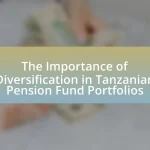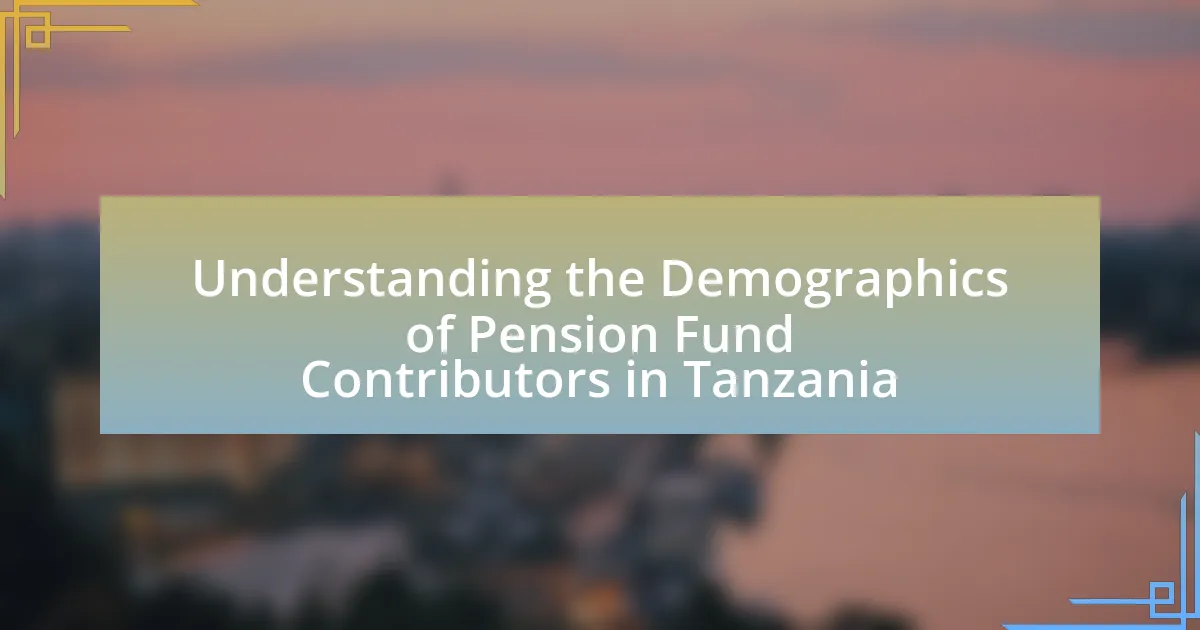The article examines the critical role of government policies in shaping the outcomes of pension funds in Tanzania. It outlines how regulatory frameworks, such as the Pension Reform Act of 2008 and the establishment of the Social Security Regulatory Authority, influence fund management, investment strategies, and benefit disbursement. The discussion highlights the impact of these policies on financial literacy, accessibility, and inclusivity of pension schemes, as well as the challenges faced by pension funds without effective regulations. Additionally, the article explores historical contexts, current reforms, and best practices from other countries that could enhance the sustainability and performance of Tanzanian pension funds.

What is the role of government policies in shaping Tanzanian pension fund outcomes?
Government policies play a crucial role in shaping Tanzanian pension fund outcomes by establishing regulatory frameworks that govern fund management, investment strategies, and benefit disbursement. These policies ensure that pension funds operate within a structured environment, promoting transparency and accountability. For instance, the National Social Security Fund (NSSF) Act mandates specific investment guidelines, which influence how funds are allocated and managed, ultimately affecting the financial security of retirees. Additionally, government initiatives aimed at increasing financial literacy among citizens can enhance participation in pension schemes, thereby improving overall fund performance and sustainability.
How do government policies influence pension fund regulations in Tanzania?
Government policies significantly influence pension fund regulations in Tanzania by establishing the legal framework and operational guidelines for pension schemes. The Tanzanian government, through the Ministry of Finance and the Social Security Regulatory Authority, enacts laws that dictate the minimum funding requirements, investment strategies, and governance structures of pension funds. For instance, the Pension Act of 2008 mandates that pension funds maintain a certain level of liquidity and diversify their investments to mitigate risks, ensuring the protection of beneficiaries’ interests. Additionally, government policies promote financial literacy and encourage formal sector participation in pension schemes, which directly impacts the growth and sustainability of these funds.
What specific policies have been implemented to regulate pension funds?
The specific policies implemented to regulate pension funds in Tanzania include the Pension Reform Act of 2008, which established a legal framework for the management and operation of pension schemes. This act introduced mandatory contributions for both employers and employees, set minimum funding levels, and established the National Social Security Fund (NSSF) as a key player in the pension landscape. Additionally, the Social Security Regulatory Authority (SSRA) was created to oversee compliance and ensure the protection of members’ rights. These policies aim to enhance the sustainability and efficiency of pension funds, ensuring that they meet the long-term needs of retirees.
How do these regulations impact pension fund management?
Regulations significantly impact pension fund management by establishing guidelines that dictate investment strategies, risk management, and reporting requirements. For instance, regulations may require pension funds to maintain a certain level of liquidity, which influences their asset allocation decisions. Additionally, compliance with regulatory frameworks, such as the Pension Act in Tanzania, mandates transparency and accountability, thereby affecting how funds are managed and reported to stakeholders. These regulations aim to protect beneficiaries and ensure the long-term sustainability of pension funds, ultimately shaping their operational practices and financial health.
Why are government policies critical for pension fund sustainability in Tanzania?
Government policies are critical for pension fund sustainability in Tanzania because they establish the regulatory framework that governs fund management, investment strategies, and benefit payouts. These policies ensure that pension funds operate within a structured environment that promotes transparency, accountability, and financial stability. For instance, the Tanzanian government has implemented laws such as the National Social Security Fund Act, which mandates contributions and outlines the responsibilities of pension fund managers. This legal framework is essential for protecting the interests of contributors and ensuring that funds are adequately managed to meet future liabilities. Additionally, government policies can influence economic conditions, such as inflation and employment rates, which directly affect the performance of pension funds. Thus, effective government policies are vital for maintaining the integrity and sustainability of pension funds in Tanzania.
What challenges do pension funds face without effective government policies?
Pension funds face significant challenges without effective government policies, including inadequate regulatory frameworks, insufficient funding mechanisms, and increased investment risks. Inadequate regulatory frameworks can lead to mismanagement and lack of transparency, which undermines the trust of contributors and beneficiaries. Insufficient funding mechanisms may result in pension funds being unable to meet their long-term obligations, as seen in various countries where pension shortfalls have led to reduced benefits for retirees. Increased investment risks arise when pension funds lack clear guidelines and support from the government, making them vulnerable to market volatility and economic downturns. These challenges highlight the critical need for robust government policies to ensure the stability and sustainability of pension funds.
How do government policies ensure the protection of pension fund members?
Government policies ensure the protection of pension fund members through regulatory frameworks that mandate transparency, solvency, and fiduciary responsibility. These policies require pension funds to maintain adequate funding levels, conduct regular audits, and provide clear information to members about their benefits and risks. For instance, the Pension Act in Tanzania establishes guidelines for the management of pension funds, ensuring that assets are safeguarded and that funds are invested prudently. Additionally, the government may provide a safety net through the Pension Guarantee Fund, which protects members’ benefits in case of fund insolvency, thereby reinforcing the security of pension savings for individuals.
What are the historical contexts of government policies affecting Tanzanian pension funds?
The historical contexts of government policies affecting Tanzanian pension funds include the establishment of the National Social Security Fund (NSSF) in 1997, which aimed to provide social security for workers in the formal sector. This was followed by the Pension Reform Act of 2008, which introduced a multi-pillar pension system to enhance coverage and sustainability. Additionally, the government’s efforts to formalize the informal sector through policies in the 2010s aimed to expand pension access. These policies were influenced by the need to address inadequate retirement savings and the economic challenges faced by the country, as highlighted by the World Bank’s reports on social protection in Tanzania.
How have past policies shaped the current pension fund landscape?
Past policies have significantly influenced the current pension fund landscape by establishing regulatory frameworks and funding mechanisms. For instance, the introduction of the National Social Security Fund (NSSF) in 1997 aimed to provide a safety net for workers, which has shaped the structure and operation of pension funds in Tanzania. Additionally, reforms in 2008 that allowed for private pension schemes encouraged competition and diversification within the sector, leading to improved services and investment strategies. These historical policy decisions have created a foundation that affects current pension fund management, investment returns, and the overall sustainability of retirement benefits for Tanzanian citizens.
What lessons can be learned from historical policy impacts?
Historical policy impacts reveal that effective governance and regulatory frameworks are crucial for the sustainability of pension funds. For instance, the introduction of the National Social Security Fund (NSSF) in Tanzania in 1997 aimed to enhance social security coverage, yet faced challenges due to inadequate enforcement and management practices. This illustrates that policies must be accompanied by strong institutional capacity and oversight to achieve desired outcomes. Additionally, lessons from global pension systems, such as the reforms in Chile during the 1980s, demonstrate that diversification of investment strategies can lead to improved fund performance. These examples underscore the importance of learning from past policy implementations to inform future decisions in shaping effective pension systems.

What are the specific outcomes of government policies on Tanzanian pension funds?
Government policies in Tanzania have led to increased regulation and oversight of pension funds, resulting in improved financial stability and transparency. Specifically, the establishment of the Social Security Regulatory Authority (SSRA) in 2008 has mandated stricter compliance and reporting standards for pension funds, which has enhanced accountability. Additionally, policies promoting the diversification of investment portfolios have allowed pension funds to achieve better returns, contributing to the overall growth of assets under management, which reached approximately 4.5 trillion Tanzanian Shillings by 2021. These outcomes demonstrate the effectiveness of government interventions in strengthening the pension fund sector in Tanzania.
How do government policies affect pension fund performance?
Government policies significantly influence pension fund performance by establishing regulatory frameworks, tax incentives, and investment guidelines. For instance, in Tanzania, the government’s regulatory policies dictate the minimum funding requirements and investment strategies that pension funds must adhere to, which directly impacts their ability to generate returns. Additionally, tax incentives provided by the government can enhance the attractiveness of pension savings, encouraging higher contributions and ultimately improving fund performance. Research indicates that countries with supportive government policies, such as favorable tax treatment and clear regulatory environments, tend to have more robust pension fund performance, as evidenced by the World Bank’s findings on pension systems in developing nations.
What metrics are used to measure pension fund performance in relation to policies?
Pension fund performance in relation to policies is primarily measured using metrics such as investment returns, funding ratio, and expense ratio. Investment returns assess the profitability of the fund’s assets, indicating how well the fund is growing relative to its benchmarks. The funding ratio compares the fund’s assets to its liabilities, providing insight into its financial health and sustainability. The expense ratio evaluates the operational efficiency by measuring the costs associated with managing the fund against its total assets. These metrics are essential for understanding how government policies impact the overall effectiveness and stability of pension funds in Tanzania.
How do these policies influence investment strategies of pension funds?
Government policies significantly influence the investment strategies of pension funds by establishing regulatory frameworks and guidelines that dictate asset allocation, risk management, and investment limits. For instance, in Tanzania, policies such as the Pension Reform Act set specific requirements for pension funds to diversify their investments across various asset classes, which encourages funds to allocate a portion of their portfolios to government securities, real estate, and equities. This regulatory environment aims to ensure the stability and sustainability of pension funds, thereby impacting their overall investment strategies. Additionally, government incentives, such as tax benefits for investing in certain sectors, further shape the decision-making processes of pension funds, leading them to prioritize investments that align with national economic goals.
What role do government policies play in pension fund accessibility for citizens?
Government policies significantly influence pension fund accessibility for citizens by establishing regulatory frameworks that dictate the structure, funding, and management of pension systems. In Tanzania, for instance, the National Pension Act of 2008 created a mandatory pension scheme for formal sector workers, thereby increasing accessibility for a larger segment of the population. Additionally, government initiatives aimed at financial literacy and awareness enhance citizens’ understanding of their pension rights and options, further promoting participation in pension schemes. These policies are crucial in ensuring that pension funds are not only available but also effectively utilized by citizens, as evidenced by the increase in registered pension fund members from 1.5 million in 2008 to over 3 million by 2020, reflecting the impact of government regulations on accessibility.
How do policies impact the inclusivity of pension schemes for different demographics?
Policies significantly impact the inclusivity of pension schemes for different demographics by establishing eligibility criteria, contribution rates, and benefit structures that can either promote or hinder access. For instance, policies that mandate universal coverage can enhance inclusivity by ensuring that marginalized groups, such as informal sector workers and women, are included in pension schemes. Conversely, restrictive policies that set high minimum contribution levels may exclude low-income individuals, thereby perpetuating inequality. Evidence from the International Labour Organization indicates that countries with inclusive pension policies, such as those offering flat-rate benefits or subsidies for low earners, experience higher participation rates among diverse demographic groups.
What initiatives have been introduced to enhance accessibility?
The Tanzanian government has introduced several initiatives to enhance accessibility to pension funds. These initiatives include the establishment of the National Social Security Fund (NSSF) and the Public Service Pension Fund (PSPF), which aim to provide broader coverage and easier access to pension services for all citizens. Additionally, the government has implemented digital platforms that allow for online registration and management of pension accounts, significantly reducing barriers for users. According to the National Bureau of Statistics, as of 2022, these initiatives have increased pension fund membership by over 30%, demonstrating their effectiveness in improving accessibility.
How do government policies affect the financial literacy of pension fund members?
Government policies significantly influence the financial literacy of pension fund members by establishing regulatory frameworks and educational initiatives. For instance, policies that mandate financial education programs within pension schemes can enhance members’ understanding of investment options and retirement planning. A study by the International Labour Organization in 2020 highlighted that countries with structured financial literacy programs saw a 30% increase in members’ knowledge about their pension rights and benefits. Furthermore, government regulations that require transparency in pension fund operations can empower members to make informed decisions, thereby improving their financial literacy.
What educational programs are supported by government policies?
Government policies in Tanzania support various educational programs, including vocational training, primary and secondary education initiatives, and higher education funding. These programs aim to enhance skill development and improve literacy rates, which are essential for economic growth and workforce readiness. For instance, the Tanzanian government has implemented the Education and Training Policy, which emphasizes access to quality education at all levels and promotes technical and vocational education and training (TVET) to meet labor market demands. Additionally, the government allocates a significant portion of its budget to education, reflecting its commitment to improving educational outcomes and fostering human capital development.
How does increased financial literacy influence pension fund outcomes?
Increased financial literacy significantly enhances pension fund outcomes by enabling individuals to make informed investment decisions and effectively manage their retirement savings. Research indicates that individuals with higher financial literacy are more likely to participate in pension plans, contribute adequately, and select appropriate investment options, which leads to improved retirement savings. For instance, a study by Lusardi and Mitchell (2014) found that financially literate individuals are 1.5 times more likely to plan for retirement compared to those with low financial literacy. This correlation suggests that as financial literacy increases, so does the likelihood of achieving better financial security in retirement, ultimately resulting in more favorable pension fund outcomes.

What are the future implications of government policies on Tanzanian pension funds?
Government policies will significantly influence the future of Tanzanian pension funds by determining their regulatory framework, investment strategies, and financial sustainability. For instance, recent reforms aimed at enhancing transparency and accountability in pension fund management are expected to attract more investments and improve fund performance. Additionally, policies that promote diversification of investment portfolios can mitigate risks and enhance returns, thereby ensuring better retirement benefits for contributors. Historical data indicates that countries with robust regulatory environments for pension funds tend to have higher levels of fund growth and stability, which supports the notion that effective government policies are crucial for the long-term viability of Tanzanian pension funds.
How might upcoming reforms change the pension fund landscape in Tanzania?
Upcoming reforms are expected to significantly alter the pension fund landscape in Tanzania by enhancing regulatory frameworks and increasing contributions. The Tanzanian government aims to improve the sustainability and efficiency of pension funds through measures such as mandatory contributions for informal sector workers and the introduction of new investment guidelines. These reforms are designed to expand coverage, ensuring that a larger portion of the population benefits from pension schemes, which currently only cover about 10% of the workforce. Additionally, the reforms may lead to better fund management practices, ultimately increasing the returns on investments and providing more financial security for retirees.
What proposed policies are currently under discussion?
Proposed policies currently under discussion regarding Tanzanian pension fund outcomes include the introduction of a mandatory pension scheme for all workers, the enhancement of regulatory frameworks to ensure better fund management, and the establishment of a national pension fund to consolidate various pension schemes. These discussions are aimed at increasing coverage and sustainability of pension funds in Tanzania. The necessity for these policies is underscored by the fact that only about 10% of the workforce is currently covered by formal pension schemes, highlighting a significant gap in social security.
How could these reforms address existing challenges in the pension system?
Reforms in the Tanzanian pension system could address existing challenges by enhancing financial sustainability and improving coverage. Specifically, these reforms may introduce measures such as increasing contribution rates, diversifying investment strategies, and expanding eligibility criteria to include informal sector workers. For instance, increasing contribution rates can bolster fund reserves, ensuring that pensions are adequately funded for future retirees. Additionally, diversifying investments can mitigate risks and enhance returns, which is crucial given that the current system faces funding shortfalls. Expanding coverage to informal workers can significantly increase the number of contributors, thereby strengthening the overall financial base of the pension system. These targeted reforms are essential for overcoming the current limitations and ensuring long-term viability of pension benefits in Tanzania.
What best practices can be adopted from other countries’ pension policies?
Countries like Sweden and the Netherlands exemplify best practices in pension policies that Tanzania can adopt. Sweden’s system emphasizes a combination of mandatory savings and a flexible retirement age, allowing individuals to tailor their retirement plans according to personal circumstances. This approach has resulted in a sustainable pension system with high replacement rates. The Netherlands employs a multi-pillar system that includes a robust public pension, occupational pensions, and private savings, ensuring diverse income sources for retirees. This diversification mitigates risks associated with economic fluctuations and demographic changes. Implementing similar strategies in Tanzania could enhance the sustainability and adequacy of its pension system, addressing current challenges such as low coverage and insufficient benefits.
How can Tanzania learn from international pension fund successes?
Tanzania can learn from international pension fund successes by adopting best practices in governance, investment strategies, and regulatory frameworks. For instance, countries like Sweden and the Netherlands have implemented robust governance structures that ensure transparency and accountability, which can enhance trust in Tanzania’s pension system. Additionally, these countries have diversified their investment portfolios, achieving higher returns while managing risks effectively. According to the OECD, the average return on pension fund investments in these nations has consistently outperformed global benchmarks, demonstrating the benefits of strategic asset allocation. By studying these successful models, Tanzania can reform its pension policies to improve sustainability and financial security for its citizens.
What adaptations are necessary for local context in Tanzania?
Adaptations necessary for local context in Tanzania include tailoring pension policies to address the unique socio-economic conditions and cultural practices of the population. For instance, the Tanzanian government must consider the informal employment sector, which comprises a significant portion of the workforce, as traditional pension schemes often overlook these workers. Additionally, integrating community-based savings and pension models can enhance participation and sustainability. Evidence from the National Bureau of Statistics indicates that over 80% of Tanzanians work in informal sectors, highlighting the need for inclusive policies that cater to this demographic.
What practical steps can stakeholders take to improve pension fund outcomes?
Stakeholders can improve pension fund outcomes by enhancing governance structures, increasing transparency, and diversifying investment strategies. Enhanced governance structures, such as establishing independent boards and implementing robust risk management frameworks, ensure that pension funds operate efficiently and align with beneficiaries’ interests. Increased transparency, including regular reporting and disclosure of fund performance, builds trust and allows stakeholders to make informed decisions. Diversifying investment strategies, by allocating assets across various sectors and geographies, can mitigate risks and improve returns. For instance, a study by the International Labour Organization highlights that diversified portfolios can lead to better risk-adjusted returns, ultimately benefiting pension fund members.





